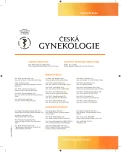Spontaneous antepartal RhD alloimmunization
Authors:
M. Studničková 1
; I. Holusková 2; V. Durdová 1
; T. Kratochvílová 1
; P. Strašilová 1; I. Marková 1; M. Lubušký
Authors‘ workplace:
Porodnicko-gynekologická klinika LF UP a FN, Olomouc, přednosta prof. MUDr. R. Pilka, Ph. D.
1; Transfuzní oddělení FN, Olomouc, primářka MUDr. D. Galuszková, Ph. D., MBA
2
Published in:
Ceska Gynekol 2015; 80(6): 401-404
Overview
Aim of the study:
Assess the incidence of spontaneous antepartal RhD alloimmunization in RhD negative pregnant women with an RhD positive fetus.
Design:
Clinical study.
Setting:
Department of Obstetrics and Gynecology, Medical School and University Hospital Olomouc.
Methods:
A total of 906 RhD negative women with an RhD positive fetus and without the presence of anti-Dalloantibodies at the beginning of pregnancy were examined. Always it was a singleton pregnancy, RhD blood group of the pregnant women was assessed in the 1st trimester of pregnancy, RhD status of the fetus was determined after delivery. Screening for irregular antierythrocyte antibodies was performed in all women in the 1st trimester of pregnancy, at 28–32 weeks gestation and immediately prior to delivery at 38–42 weeks gestation. Screening for irregular antierythrocyte antibodies was performed also at 6 months following delivery in all cases of positive antibodies before delivery. Antibody screening was performed using the indirect antiglobulin (LISS/NAT) and enzyme (papain) test with their subsequent identification using a panel of reference erythrocytes by column agglutination method Dia-Med. After delivery, the volume of fetomaternal hemorrhage was assesed in all RhD negative women and RhD alloimmunization prophylaxis was performed by administering the necessary IgG anti-D dose; none of the women were administered IgG anti-D antepartally.
Results:
During screening for irregular antierythrocyte antibodies at 28–32 weeks gestation, anti-D alloantibodies were diagnosed in 0.2% of the women (2/906); immediately prior to the delivery at 38-42 weeks gestation, anti-D alloantibodies were diagnosed in 2.3% of the women (21/906) and repeatedly even at 6 months following delivery (21/157). In 82.7% of the women (749/906), examination at 6 months following delivery was not performed, therefore in these women spontaneous antepartal RhD alloimmunization cannot reliably be ruled out. Alloimmunization may not be diagnosed yet at term of delivery. If anti-D alloantibodies were not present prior to the delivery, these women were all administered IgG anti-D in a dose of at least 125 μg after delivery.
Conclusion:
In RhD negative women with an RhD positive fetus, the incidence of spontaneous antepartal RhD alloimmunization was at least 2.3%. Most cases may theoretically be prevented by prophylactic administration of 250 μg of IgG anti-D to all RhD negative women at 28 weeks gestation.
Keywords:
RhD alloimunization, hemolytic disease of the fetus and newborn, IgG anti-D
Sources
1. Crowther, CA., Middleton, P., McBain, R.D. Anti-D administration in pregnancy for preventing Rhesus alloimmonisation (Rewiev). The Cochrane Library, 2013, Issue 2.
2. Egbor, M., Knott, P., Bhide, A. Red-cell and platelet alloimmunisation in pregnancy. Best Practice Res Clin Obstet Gynaecol, 2012, p. 119–132.
3. Holusková I., Lubušký, M., Studničková, M., et al. Erytrocytární aloimunizace u těhotných žen, klinický význam a laboratorní diagnostika. Čes Gynek, 2013, 78(1), s. 89–99.
4. Holusková, I., Lubušký, M., Studničková, M., et al. Incidence erytrocytární aloimunizace u těhotných žen v olomouckém regionu. Čes Gynek, 2013, 78(1), s. 56–61.
5. Kenneth, JM. Prevention of Rh(D) alloimmunization. UpToDate, 2014.
6. Kenneth, JM. Overview of Rhesus (Rh) alloimmunization in pregnancy. UpToDate, 2014.
7. Lee, D., Rawlinson, V. Multicentre trial of antepartum low-dose anti-D immunoglobulin. Transfusion Med, 1995, 5, p. 15–19.
8. Lubušký, M. Význam vyšetření protilátek a krevní skupiny v těhotenství. Čes Gynek, 2015, 80(3), s. 236–238.
9. Lubušký, M., Procházka, M., Šimetka, O., et al. Doporučení k provádění prevence RhD aloimunizace u RhD negativních žen. Doporučený postup ČGPS ČLS JEP. Čes Gynek, 2013, 78(2), s. 132–133.
10. Lubušký, M., Procházka, M. Erytrocytární aloimunizace těhotných žen, hemolytická nemoc plodu a novorozence. Postgrad Med, 2012, 14(3), s. 284–288.
11. Lubušký, M., Procházka, M., Šimetka, O., et al. Doporučení k provádění prevence RhD aloimunizace u RhD negativních žen. Postgrad Med, 2012, 14(3), s. 288–289.
12. Moise, KJ. Management of rhesus alloimmunization in pregnancy. Obstet Gynecol, 2002, 100, p. 600–611.
Labels
Paediatric gynaecology Gynaecology and obstetrics Reproduction medicineArticle was published in
Czech Gynaecology

2015 Issue 6
-
All articles in this issue
- Nine-valent HPV vaccine - new generation of HPV vaccine
- Spontaneous antepartal RhD alloimmunization
- Prognostic significance of Pgp, MRP1, and MRP3 in ovarian cancer patients
- Cytological-energetic principle of the amniotic fluid examination on female patients with diagnosisof preterm premature rupture of membranes – up to now experiences and perspectives
- Thrombophilia in pregnacy
- Satisfaction with perinatal care in Vysočina region in the period between October 2013 and September 2014
- Utilization of self-sampling kits for HPV testing in cervical cancer screening – pilot study
- Hyperthyroidism in pregnancy, less common disorder of the thyroid gland complicating the pregnancy
- Severe ovarian hyperstimulation syndrome – case study
- Medical termination of pregnancy by mifepristone and misoprostol – evaluation of succes rate, complications and satisfaction of patients
- Czech Gynaecology
- Journal archive
- Current issue
- About the journal
Most read in this issue
- Medical termination of pregnancy by mifepristone and misoprostol – evaluation of succes rate, complications and satisfaction of patients
- Severe ovarian hyperstimulation syndrome – case study
- Thrombophilia in pregnacy
- Hyperthyroidism in pregnancy, less common disorder of the thyroid gland complicating the pregnancy
